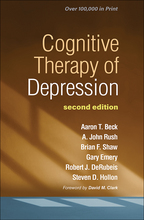Cognitive Therapy of Depression
Second Edition
Aaron T. Beck, A. John Rush, Brian F. Shaw, Gary Emery, Robert J. DeRubeis, and Steven D. Hollon
Foreword by David M. Clark
HardcoverPaperbacke-bookprint + e-book
Hardcover
orderJune 28, 2024
ISBN 9781462554485
Price: $89.00 406 Pages
Size: 6" x 9"
Paperback
orderJuly 11, 2024
ISBN 9781572305823
Price: $59.00406 Pages
Size: 6" x 9"
e-book
orderJune 4, 2024
PDF and Accessible ePub ?
Price: $59.00 406 Pages
ePub is Global Certified Accessible
print + e-book $118.00 $70.80
orderPaperback + e-Book (PDF and Accessible ePub) ?
Price: 406 Pages
ePub is Global Certified Accessible
| Watch the book trailer for Cognitive Therapy for Depression, Second Edition. |  |
| Watch an interview with with Robert J. DeRubeis and Seven D. Hollon. |  |
Read a Q&A with featured author, Steven D. Hollon!
“This second edition clarifies misunderstandings of cognitive therapy and consolidates 'lessons learned' from 45 years of research, therapist training, and clinical experience. Chapters have been substantially rewritten, resulting in a coherent and engaging text….This book is authored by six professionals with exceptional knowledge in the area of cognitive therapy….The book is authoritative and will serve as an excellent source for those to who wish to enhance their knowledge of cognitive therapy.”

—Doody's Review Service
“As the first fully realized manual guiding CT for depression, this work can be said without hyperbole to have revolutionized the field of psychotherapy. Now a new generation of psychotherapists will benefit greatly from this updated and expanded second edition that integrates the considerable wisdom acquired in the ensuing decades. Beck contributed substantially to this revision before his death at age 100, and his coauthors include the leading authorities in CT today. Every clinician treating depression will benefit from this easy-to-follow CT guide.”

—David H. Barlow, PhD, ABPP, Professor Emeritus of Psychology and Psychiatry and Founder, Center for Anxiety and Related Disorders, Boston University
“This eagerly awaited second edition brings the field up to date with an integration of theory, research, and practice. The theme of helping people with depression shift from seeing themselves as incompetent or defective to seeing their difficulties as resulting from use of ineffective strategies is a welcome reframing of depression treatment. Even experienced cognitive therapists will find guidance to improve their effectiveness and correct 'drift' from best practices.”

—Christine A. Padesky, PhD, author of The Clinician’s Guide to CBT Using Mind Over Mood
“The second edition of this seminal text has been extensively rewritten to include numerous theoretical, research, and clinical advances. The review of treatment outcome research since the original edition—written by luminaries in the field who had a large part in shaping these discoveries—makes the book extremely worthwhile on its own. The addition of practical demonstrations, including an extensive case example, only adds to the book's utility as a teaching tool. This is an ideal text for undergraduate classes such as Introduction to Clinical Psychology, as well as graduate courses addressing evidence-based therapeutic techniques, clinical conceptualization, or historical developments in psychosocial intervention.”

—John Young, PhD, Department of Psychology, University of Mississippi
—Doody's Review Service
“As the first fully realized manual guiding CT for depression, this work can be said without hyperbole to have revolutionized the field of psychotherapy. Now a new generation of psychotherapists will benefit greatly from this updated and expanded second edition that integrates the considerable wisdom acquired in the ensuing decades. Beck contributed substantially to this revision before his death at age 100, and his coauthors include the leading authorities in CT today. Every clinician treating depression will benefit from this easy-to-follow CT guide.”
—David H. Barlow, PhD, ABPP, Professor Emeritus of Psychology and Psychiatry and Founder, Center for Anxiety and Related Disorders, Boston University
“This eagerly awaited second edition brings the field up to date with an integration of theory, research, and practice. The theme of helping people with depression shift from seeing themselves as incompetent or defective to seeing their difficulties as resulting from use of ineffective strategies is a welcome reframing of depression treatment. Even experienced cognitive therapists will find guidance to improve their effectiveness and correct 'drift' from best practices.”
—Christine A. Padesky, PhD, author of The Clinician’s Guide to CBT Using Mind Over Mood
“The second edition of this seminal text has been extensively rewritten to include numerous theoretical, research, and clinical advances. The review of treatment outcome research since the original edition—written by luminaries in the field who had a large part in shaping these discoveries—makes the book extremely worthwhile on its own. The addition of practical demonstrations, including an extensive case example, only adds to the book's utility as a teaching tool. This is an ideal text for undergraduate classes such as Introduction to Clinical Psychology, as well as graduate courses addressing evidence-based therapeutic techniques, clinical conceptualization, or historical developments in psychosocial intervention.”
—John Young, PhD, Department of Psychology, University of Mississippi



